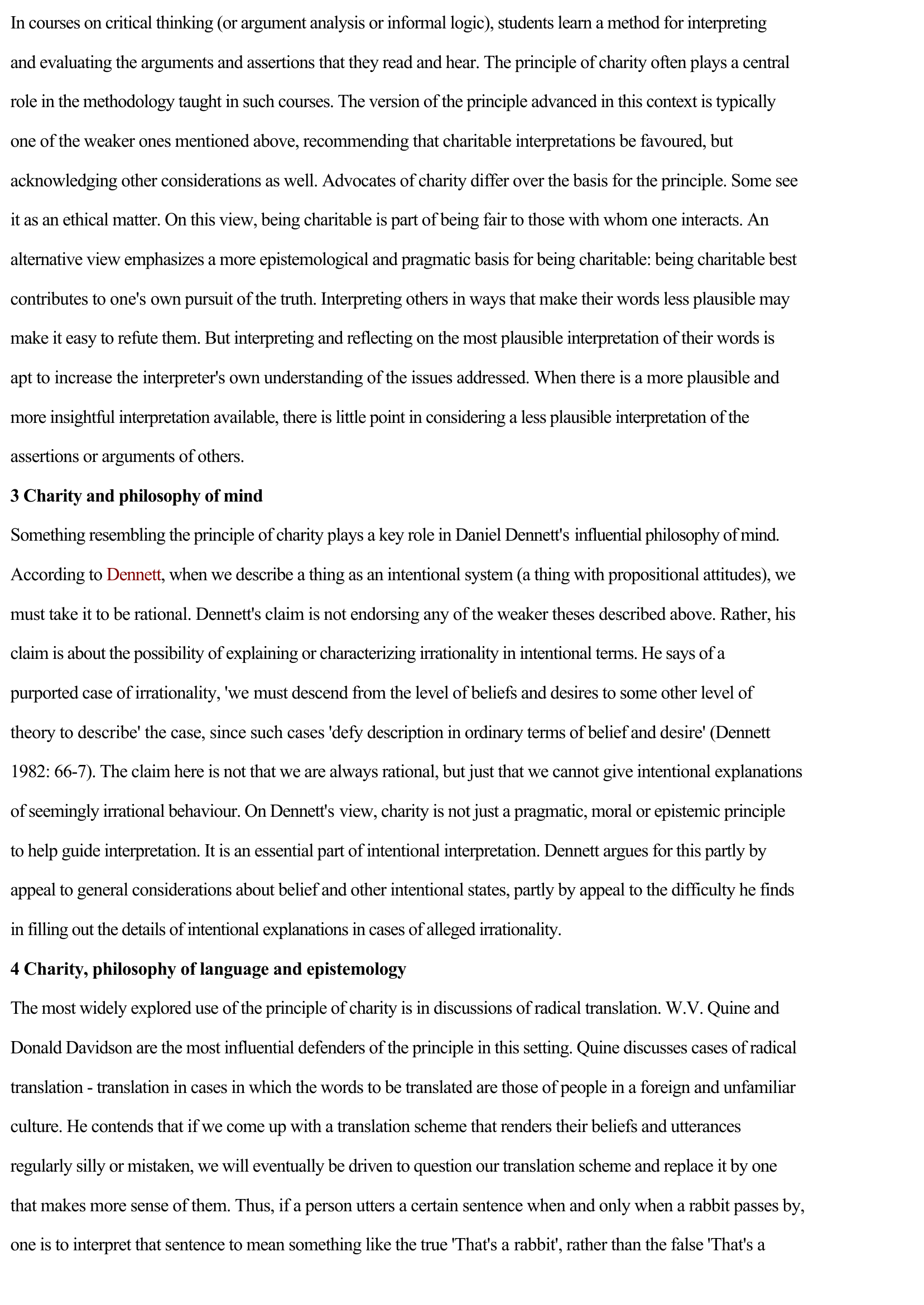Principle of Charity
Publié le 22/02/2012
Extrait du document
«
In courses on critical thinking (or argument analysis or informal logic), students learn a method for interpreting
and evaluating the arguments and assertions that they read and hear.
The principle of charity often plays a central
role in the methodology taught in such courses.
The version of the principle advanced in this context is typically
one of the weaker ones mentioned above, recommending that charitable interpretations be favoured, but
acknowledging other considerations as well.
Advocates of charity differ over the basis for the principle.
Some see
it as an ethical matter.
On this view, being charitable is part of being fair to those with whom one interacts.
An
alternative view emphasizes a more epistemological and pragmatic basis for being charitable: being charitable best
contributes to one's own pursuit of the truth.
Interpreting others in ways that make their words less plausible may
make it easy to refute them.
But interpreting and reflecting on the most plausible interpretation of their words is
apt to increase the interpreter's own understanding of the issues addressed.
When there is a more plausible and
more insightful interpretation available, there is little point in considering a less plausible interpretation of the
assertions or arguments of others.
3 Charity and philosophy of mind
Something resembling the principle of charity plays a key role in Daniel Dennett 's influential philosophy of mind.
According to Dennett , when we describe a thing as an intentional system (a thing with propositional attitudes), we
must take it to be rational.
Dennett's claim is not endorsing any of the weaker theses described above.
Rather, his
claim is about the possibility of explaining or characterizing irrationality in intentional terms.
He says of a
purported case of irrationality, 'we must descend from the level of beliefs and desires to some other level of
theory to describe' the case, since such cases 'defy description in ordinary terms of belief and desire' (Dennett
1982: 66-7).
The claim here is not that we are always rational, but just that we cannot give intentional explanations
of seemingly irrational behaviour.
On Dennett 's view, charity is not just a pragmatic, moral or epistemic principle
to help guide interpretation.
It is an essential part of intentional interpretation.
Dennett argues for this partly by
appeal to general considerations about belief and other intentional states, partly by appeal to the difficulty he finds
in filling out the details of intentional explanations in cases of alleged irrationality.
4 Charity, philosophy of language and epistemology
The most widely explored use of the principle of charity is in discussions of radical translation.
W.V.
Quine and
Donald Davidson are the most influential defenders of the principle in this setting.
Quine discusses cases of radical
translation - translation in cases in which the words to be translated are those of people in a foreign and unfamiliar
culture.
He contends that if we come up with a translation scheme that renders their beliefs and utterances
regularly silly or mistaken, we will eventually be driven to question our translation scheme and replace it by one
that makes more sense of them.
Thus, if a person utters a certain sentence when and only when a rabbit passes by,
one is to interpret that sentence to mean something like the true 'That's a rabbit' , rather than the false 'That's a.
»
↓↓↓ APERÇU DU DOCUMENT ↓↓↓
Liens utiles
- Styx, River Greek The principle river, or system of rivers, in Hades, the Greek Underworld (1); named for the goddess who carried the same name, Styx.
- Charity
- SWEET CHARITY
- SWEET CHARITY BOB FOSSE

































